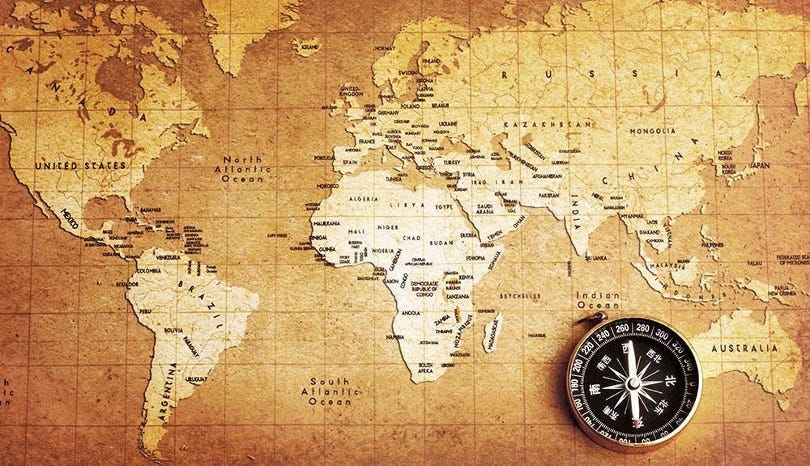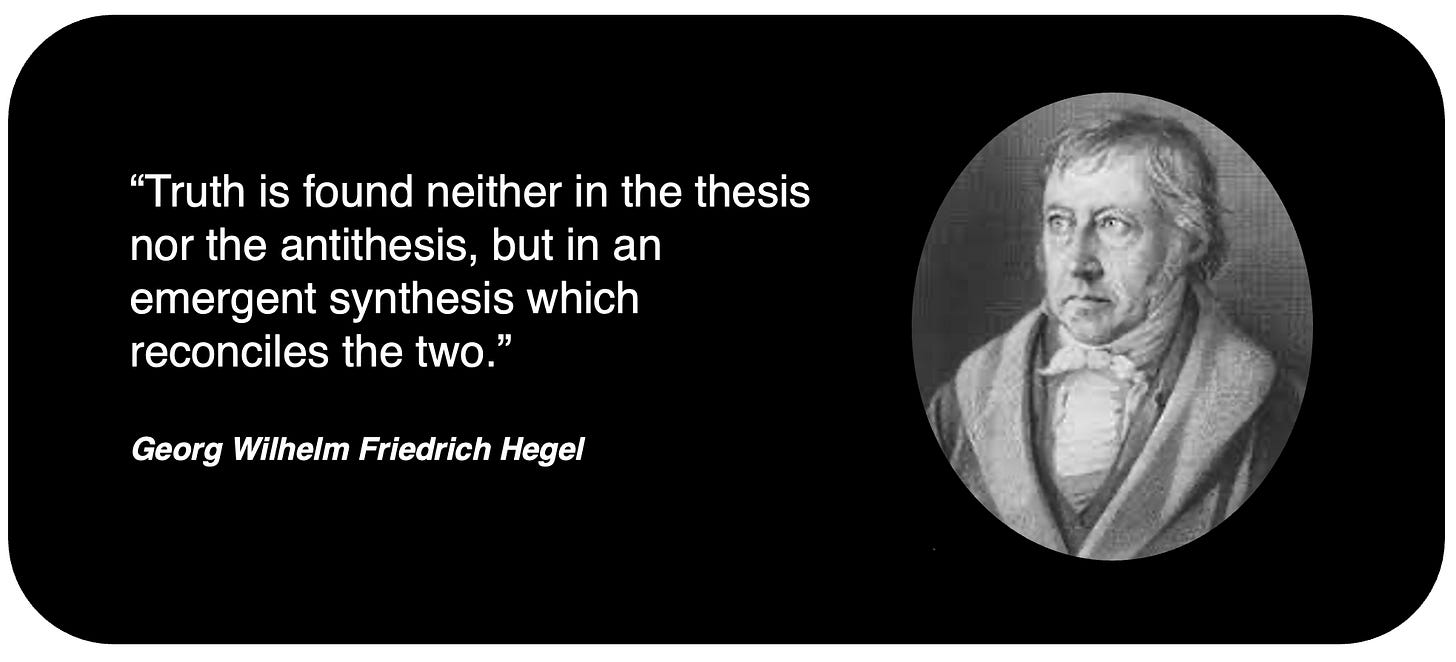What is a Good Life? # 28
Ambivalence
Good day to you all,
I hope you’re keeping well and navigating these strange times as well as you can be.
The key theme this week is Ambivalence. The interviewee speaks about the complexities and nuances of life, while I reflect on coming to terms with more aspects of myself.
This week there are only three sections in the newsletter (the insight section is omitted), as this was not a general theme frequently brought up by participants. Nonetheless, I think this is a very important theme for us to contemplate.
1. This week’s interview
Each week I share direct excerpts from an individual interview
This week’s interview is with Jessica*. Jessica is a psychology researcher and academic who speaks of the importance and difficulty of navigating ambivalence in life.
*Not the participant’s real name
What is a good life for you?
It’s a life where there's always a possibility of expanding one's capacities - the game isn't fixed. The set of possibilities for action and the set of possibilities for action that you might want to achieve, keep changing, and you keep redefining them so that, in essence, you become a different kind of being over time.
And then more than that, that you're able to contribute the same possibilities for other people. It's important that instead of having one fixed set of possibilities (once you do all these things and achieve x, then you're good), I'd rather have a world where you get to keep changing your capabilities and your goals.
What does a world full of possibilities look and feel like to you?
For me, it's obviously very tied into education. Education is the way we change our capabilities. That could be something banal, but also it could be something about new ideas that we have access to, so we can evaluate our existing world in light of something new, or it might even be a way of connecting to other people.
The ability to negotiate difference or to feel ambivalence is very important. This is part of my focus in the work and research that I do. It's really interesting to me, because it's such a fundamental part of being alive - being able to live with ambivalence. We're not very good at it, we haven't really got the neural infrastructure to deal with it well.
But it's very important that we try to, to serve that discomfort the best we can, because it's only by allowing ourselves to be ambivalent that we can really open up our mind to new options. It's very rare that you're like, “I have a lot of options and I feel totally great about all of them”, or that they are all terrible.
Most things are these shades of grey, these painful, difficult shades of grey. So, one of the capabilities that is highly important for humans to have, is to be like, “I don't know how I feel about this thing”, and then just to sit with it. If we are good at this, then all these new possibilities open up for us.
Can you talk to me about sitting in the grey area and the discomfort that that brings?
In my academic research I study cognitive dissonance. It's looks at when we have a set of existing beliefs, and then we see something that has the potential to suggest that they're wrong.
When this happens, people experience an incredible level of distress. It seems like people are experiencing the same kind of thing as hunger, thirst or physical pain. We struggle to live with this set of contradictions about something that's fundamentally important to us.
We can live with contradictions about does the fridge work? That's not tied into most immediate things we care about usually, but we can't live with it in terms of like, does my marriage work? Am I a good person?
And this is totally understandable. Because if we lived with ambivalence all the time about the most important fundamental things in our lives, you then lack a way of orienting yourself in the world. You literally don't have a map, or you have a map, but you don't know where you stand in the map.
I think the difficult thing about being a human, especially in modernity, is that whatever map you start out with, it’s not going to be enough. The world that you were being prepared for when you were growing up - it doesn't exist anymore. So, one of these key skills is remapping and remapping. I'm very interested in the discomfort that comes with remapping.
Can you think of examples of times you've experienced difficulties with ambivalence?
One of the most painful ones is when you have a conflict with somebody else, like a breakup or a challenge in a friendship or with your parents. When I must consider, did I do this wrong? Was I the bad guy? I think that's one of the most profound ones, right? Because it's almost impossible to accept. And yet, at the same time, logically, of course, you're the baddie in life sometimes.
But in a strange way, what's even more difficult is when a lot of these problems that we experience, are just too complicated to be a yes or no, like sure, you should never yell at your partner. But then there's these more complicated things, if maybe if I had been more generous in our conversation, then they would have done x, and then I could have done y.
Then, there are problems we come up with in life where it's not even that we've been bad. We've just been this like, grey, ambiguous thing. And no matter how much we map and map and remap, we just don't get a map that is simple enough. We're going to have to live with ambivalence, because the map itself requires that, and that is really hard.
Is it ambivalence, or is it two things that seem on the surface to contradict each other, are both simultaneously true, but they exist within a bigger truth?
I suspect it's the second one, but it doesn't make it easier psychologically. Hegel, the German idealist philosopher, would suggest there's always the synthesis of these seemingly contradictory things that form new ideas.
They're always parts of a whole and therefore they're never really in contradiction, and he's probably right. I guess I'm just very sympathetic to the subject who's sitting there trying to put all the pieces together, you know?!
But he's right, they must be parts of the same thing. For example, anger often comes from a place of defending something we really care about, and the same kind of care can be invested in love, etc. So rationally, that's true. But I think it's a very difficult thing to put in a map.
Another thing is, one of the fundamental insights behind psychology, is just how quickly we want shortcuts. Even unconsciously, how quickly we just we need a shortcut, because it's so hard without a shortcut. It's so exhausting.
And so, you're always grappling between, let me find the complete synthetic whole and, “oh, my God, how can I get around day to day, grappling with all of this complexity?” And I think, sadly, the answer isn't always to just keep grappling either, because that's fucking exhausting.
So in the context of a good life, at times looking for the shortcut can be helpful, and other times can be detrimental…
Exactly. Unfortunately, it's really difficult to know which one you're in, you'll never know whether you're in a shortcut situation, or a non-shortcut situation. Part of the reason why I'm very interested in living a life where you constantly expand your capabilities is because I think the challenge at hand, part of the challenge is knowing, and part of the challenge is acting.
And both require this really complicated map. And if we don't keep expanding our capabilities, the map is going to screw us over, we're going to spend either a lot of time tearing our hair out, because the map doesn't work, or we're going to have a bad map. The capabilities are, in a way, preparing us to act in better ways and to think in better ways and so on. But it's not easy.
“The more certain our knowledge the less we know.” - Georg Wilhelm Friedrich Hegel
2. This week’s reflection
Each week I share a personal reflection on the weekly theme
I’m always somewhat concerned for someone when they use the phrase, “you know that’s not me”, when said in relation to something that the person has admitted to doing.
I get the intended sentiment behind it. We may have done something that is not consistent with our normal behaviour or, more pertinent perhaps, something that doesn’t fit with our narrative of ourselves.
Although I understand our need for certainty and clarity, if the shortcuts we take come at a cost of denying the truth or evidence, we may be delaying the suffering we are looking to avoid by making an overly simplistic interpretation of ourselves and the world around us.
I see a trend when people first come to self-development whereby it initially revolves more around eradicating flaws and focusing on positives than on developing a greater awareness of all our nuanced partial truths.
Personally, I think it’s important to simultaneously recognise in me: love and anger, trust and fear, peace and conflict. The presence of one doesn’t eliminate or undermine the other, they all represent parts of me.
The more my awareness of the multitudes of internal contradictions deepens, I’ve started to notice several paradoxes at the end of my various external lines of enquiry.
If you believe in God, you may face the paradox that part of you is eternal and other parts will die.
If we look to science, the realisation that there are 200 billion trillion stars in the Universe may leave us feeling insignificant, on the other hand Chaos Theory informs us of the significant impact infinitesimally small changes can have on larger systems.
While the theory of General Relativity (larger scale) and Quantum Mechanics (smaller scale) are both individually true, they are not presently compatible.
The world is far more contradictory than we would like to admit. Although the process of letting go of certain absolute beliefs can be destabilising at first, after some time, relinquishing your perceived control of your environment can lead to far more possibilities.
“Whatever you do in life will be insignificant but it is very important that you do it because you can't know. You can't ever really know the meaning of your life.” - Gandhi
3. This week’s questions for personal reflection
Each week I pose questions to support your own inquiry into what a good life is for you
Can you recall a fundamental belief that you no longer hold? Did you ultimately expand or replace it? What prompted the change in beliefs?
What characteristics do you notice in yourself that you presently find contradictory?
About me
I’m a coach, based in Berlin (via Dublin, Ireland). I formerly had a 15-year career in Capital Markets, and for better or worse, I’ve convinced myself that I’m going to make a discovery around human thought / behaviour. If you want to contact me directly, here’s my email and LinkedIn.




